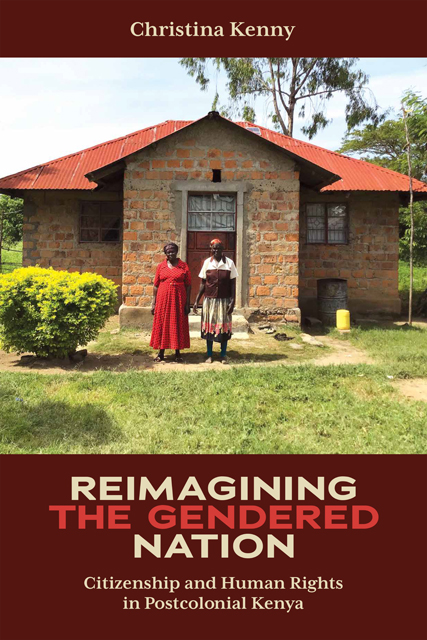Book contents
- Frontmatter
- Dedication
- Contents
- List of Illustrations
- Acknowledgements
- Note on Ethnic Identities
- List of Abbreviations
- Introduction
- 1 The Kenya Colony in British East Africa: A History of Ethno-patriarchy
- 2 Bodies as Battlefields, Bodies as Weapons: The Colonial Regulation of Women’s Bodies
- 3 Myths of Sorority: Kenyan Women’s Community Organisation
- 4 Everyday Violence: Violence against Women during Elections and Times of Peace
- 5 Gendered Citizenship, Politics and Public Space: Women’s Participation in Government
- Conclusion
- Appendix: Field Work, Focus Groups and Interviews
- Bibliography
- Index
- Eastern Africa Series
Appendix: Field Work, Focus Groups and Interviews
Published online by Cambridge University Press: 17 December 2022
- Frontmatter
- Dedication
- Contents
- List of Illustrations
- Acknowledgements
- Note on Ethnic Identities
- List of Abbreviations
- Introduction
- 1 The Kenya Colony in British East Africa: A History of Ethno-patriarchy
- 2 Bodies as Battlefields, Bodies as Weapons: The Colonial Regulation of Women’s Bodies
- 3 Myths of Sorority: Kenyan Women’s Community Organisation
- 4 Everyday Violence: Violence against Women during Elections and Times of Peace
- 5 Gendered Citizenship, Politics and Public Space: Women’s Participation in Government
- Conclusion
- Appendix: Field Work, Focus Groups and Interviews
- Bibliography
- Index
- Eastern Africa Series
Summary
The Kenya Human Rights Commission
The KHRC is a non-government organisation working on several key areas of human rights advocacy, including civil and political rights, and gender and the rights of people of diverse sexual orientation, gender identity and/or expression (SOGIE). The KHRC is actively engaged with twenty-one community-based human rights networks (HuRiNets) in five key regions of Kenya, and prioritises timely human rights monitoring, documentation and reporting.
The KHRC was established in 1991 and registered in Washington, USA, named the ‘Kenya Human Rights Commission’ to draw attention to the fact that the Moi government had no care for the human rights of Kenyans, and had not established a national commission (the statutory body, the Kenya National Commission on Human Rights (KNCHR) was established by Moi’s successor Mwai Kibaki in 2002). Since its establishment the KHRC has increasingly focused on strategies aimed at enhancing community driven human rights advocacy, through building the capacity of citizens to deal with their immediate human rights concerns as well as engaging in strategic actions to transform structures responsible for human rights violations.
The Commission’s focus on human rights monitoring and reporting and commitment to community engagement and human rights education continue to build their strong community connections across Kenya. Working with the Commission for several months allowed me to build relationships of trust within the human rights sector in Nairobi and to become known to and establish trust in local communities in Nairobi.
Focus groups
Over the two trips I conducted semi-structured focus groups and interviews in the following locations. I visited those locations in bold type on both trips:
1. Central County Nairobi (Kibera slum, and Kangemi, low-income areas)
2. Kisumu and Siaya Counties Bumala, Bar Ober, Butere, Ugunja, Ahero, Aweyo Canteen, and Nyando villages in the province of Nyanza, around Lake Victoria
3. Taita-Taveta County Taveta town
I conducted semi-structured focus group interviews, with between five and twenty participants at each focus group, about 120 women in total. The women I interviewed in these focus groups were women from two particular groups – those who were peer-to-peer human rights educators or otherwise volunteered with local right promotion groups and/ or who belonged to grassroots, voluntary women’s advocacy organisations (for instance, the KHRC’s HuRiNet partners).
- Type
- Chapter
- Information
- Reimagining the Gendered NationCitizenship and Human Rights in Postcolonial Kenya, pp. 191 - 194Publisher: Boydell & BrewerPrint publication year: 2022



